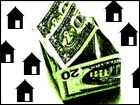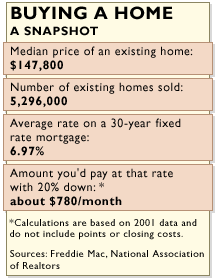
NEW YORK (CNN/Money) -
It was bad enough when interest rates were at record lows. But as the threat of rate hikes looms, homeowners have become even more aggressive in their pursuit of low-cost loans.
Those who refinanced their mortgage last year are crunching the numbers again to determine if a second refi isn't in order. Others are rushing to upgrade into bigger homes, part of a growing mad dash mentality. The fear is that a rebounding economy will spark inflation fears, sending interest rates into the stratosphere.
A word of advice: get a grip.
Experts say consumers should keep mortgage rates in perspective before signing their names on the dotted line. Economists do expect 30-year fixed rates to rise this year, but don't expect them to hit the roof overnight.
"There is some incentive to move sooner rather than later, but people shouldn't feel panicked," said Fritz Elmendorf, chief economist for the Consumer Bankers Association. "If you move now, your rate may be half a percentage point less than if you move later in the year. It's going to be a matter of a few dollars more every month, not a few hundred dollars more."
Indeed, the Mortgage Bankers Association predicts that 30-year fixed rates will stay around 7.1 percent for the first half of 2002, reaching 7.3 percent by the third quarter and 7.5 percent by the end of the year. Long-term rates today average 7.18 percent, edging up from 7.14 percent the week before.
If you're looking to buy
If you're among the millions who fear they've missed the boat, it might help to consider interest rates in their historical context. Since 1980, the 30-year fixed mortgage rate has averaged about 10.15 percent. The average peaked at 16.6 percent in 1981 and bottomed out at just under 7 percent, in both last year and in 1998, according to Freddie Mac.

"If you're going to buy and you know the property, there's no reason to delay," said Doug Duncan, a senior vice-president and chief economist at the Mortgage Bankers Association. "But if you plan to buy later in the year, 7.5 percent is still very good, especially in the context of longer, historical rate trends. Don't compare them to the rates we saw in the late fall -- we were just at lows that hadn't been seen for about 30 years."
Anyone looking to refinance or move to a new home should take a long hard look at the growing roster of mortgage products on the market -- including fixed- and variable-rate loans. Consider not only the interest rate on the loan, but any points or origination fees you'll pay, how long you plan to stay in the house and your closing costs.
One-year adjustable rate mortgages, or ARMs, for example, have a low fixed rate during the first year of the mortgage, but the interest rate fluctuates thereafter along with the Treasury to which it is tied. A new hybrid is the 5:1 loan, in which rates are fixed for 5 years, then fluctuate.
Most people choose these loans if they expect rates to drop after the fixed term. But because rates are so low already, experts say they're unlikely to fall further -- so variable-rate loans may not be the best deal these days, unless you plan to stay in the home for a very short time.
"Mortgage rates are so low that there's probably more risk in an ARM than there is potential benefit," said Stephen Brobeck, executive director for the Consumer Federation of America. "If you plan to hold the mortgage for a lot more than 5 years, then the same probably goes for a 5:1 mortgage. If you plan to sell within 5 years or shortly thereafter, however, you're not subject to that risk."
Those who need predictability should instead lock in today's low rates using a fixed-rate product over a 15- or 30-year period.
A final note: If you've already bought a new property, but are several months from closing, consider locking in your interest rate today, said Brobeck. Typically, the rate is locked in 2 to 3 weeks before you close. Anything sooner and the bank charges a fee, since they're taking a risk that rates could climb. But with mortgages rates trending higher, you're still likely to save money over time through lower monthly payments.
"It might still be slightly better [even with the early lock-in fee] than the rate you [will] get in 2 to 3 months," Brobeck said.
If you want a refi
Those who haven't yet acted on lower interest rates need not panic, but they should act soon.
"There are still some people who took out loans at 8.5 percent a year-and-a-half ago, and they can still refinance -- now -- at 7.1 percent," Duncan said. "But rates are going to go up, and later in the year, those opportunities will decline."
| |
 Related stories
Related stories
| |
| | |
| | |
|
He notes, however, that homeowners considering a cash-out refinancing have more time to burn. Cash-outs, which are less driven by interest rates, allow homeowners to tap the equity in their home, especially in cases where the value has appreciated.
"People who refinance later in the year will do so primarily to tap equity, rather than reduce rates," Duncan said. "I'd say 3 out of 4 people who refinance in late 2002 will be taking cash-out refis."

|

